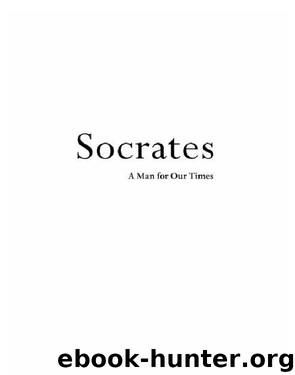Socrates: A Man for Our Times by Paul Johnson

Author:Paul Johnson
Language: eng
Format: mobi, epub
Tags: Biography & Autobiography, Philosophers, History & Surveys, Philosophy, Ancient & Classical
ISBN: 9780670023035
Publisher: Penguin
Published: 2011-10-13T00:00:00+00:00
This passage may strike a modern reader as surprising. While it shows that Socrates was not inclined to homosexuality, it also shows him passively acquiescent in the face of Alcibiades’ advances. There was no rejection because Socrates saw only too well that his failure to respond would be a grievous injury to Alcibiades’ pride. Anything more would have been unbearably brutal. His passivity was exact and well judged.
We can now turn to his relationships with women and his view of their function in society. The evidence is not very plentiful, but what there is proves exceptionally interesting. During the Symposium, as described by Plato, the conversation turns to love, and Socrates introduces the character of Diotima of Mantinea, a city in Arcadia. He says, “She was my instructress in the art of love, and I shall try to repeat to you what she said to me.” He says she was “a woman wise in this and many other kinds of knowledge.” He also says that she advised the Athenians on the way in which they should offer sacrifice to prevent the plague, which was spreading over Greece, from coming to Athens, and as a result of her efforts, it was delayed ten years. She seems, then, to have been some kind of priestess.
There follow, in Plato’s account, several thousand words of dialogue between Diotima and Socrates, the woman taking the lead and Socrates submitting. Much of the substance, on the nature of love, is pure Plato, with his “forms” and his peculiar view of the soul and the “recovery” of knowledge. It need not concern us here, merely illustrating his irritating habit of foisting his personal views on others, in this instance Diotima as well as Socrates. There are, however, three aspects of this section of the Symposium that strike us forcibly. First, this is the only time Socrates tells us directly about his education and how he was taught by this remarkable woman. There has been much speculation about who influenced him as a young man and shaped his approach to philosophy. But here we are actually given a glimpse of his training, and it is fascinating to learn that his teacher was female—most unusual in the Athens of the fifth century B.C. Second, Diotima uses what we have come to call the Socratic method of questioning, with Socrates, in this instance, on the receiving end. She “examines” him. Now it is true that she then goes on to teach and impart knowledge in a way Socrates himself usually avoids, so that the discussion of love reaches a conclusion. All the same, it is striking that Socrates was introduced to his examination technique by a woman. He extended and refined it, but he did not entirely invent it. Diotima was thus more important in creating the Socrates we know than any other human being.
Third, there is a remarkable passage in Diotima’s account of love concerning childbirth: its suffering, its glory, and its beauty. There is nothing quite like it in the whole of Greek literature.
Download
Socrates: A Man for Our Times by Paul Johnson.epub
This site does not store any files on its server. We only index and link to content provided by other sites. Please contact the content providers to delete copyright contents if any and email us, we'll remove relevant links or contents immediately.
Hit Refresh by Satya Nadella(9118)
When Breath Becomes Air by Paul Kalanithi(8422)
The Girl Without a Voice by Casey Watson(7880)
A Court of Wings and Ruin by Sarah J. Maas(7809)
Do No Harm Stories of Life, Death and Brain Surgery by Henry Marsh(6931)
Shoe Dog by Phil Knight(5255)
The Rules Do Not Apply by Ariel Levy(4953)
A Higher Loyalty: Truth, Lies, and Leadership by James Comey(4946)
Hunger by Roxane Gay(4920)
Tuesdays with Morrie by Mitch Albom(4766)
Everything Happens for a Reason by Kate Bowler(4729)
The Immortal Life of Henrietta Lacks by Rebecca Skloot(4571)
Millionaire: The Philanderer, Gambler, and Duelist Who Invented Modern Finance by Janet Gleeson(4461)
How to Change Your Mind by Michael Pollan(4354)
All Creatures Great and Small by James Herriot(4305)
The Money Culture by Michael Lewis(4189)
Man and His Symbols by Carl Gustav Jung(4120)
Elon Musk by Ashlee Vance(4118)
Tokyo Vice: An American Reporter on the Police Beat in Japan by Jake Adelstein(3976)
